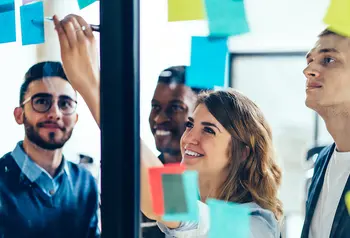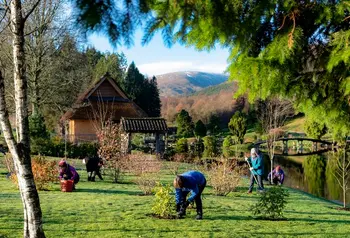Collaborate, don’t compete, to support innovation and drive change

Digital transformation is probably at the top of the agenda for most leaders within environmental organisations, and in many other sectors as well.
We live in a digital world now – we need to understand it and how to work with it.
Our Strategy 2030 has a very strong focus on putting transformation and digital transformation into practice in all areas of our work. The phase we’re in now is how we can make that real in everything we do, changing how we approach activities to achieve our objectives. This includes:
- shifting our thinking from customers just coming through the doors of our visitor centre, to their experience with us online, through projects, how they take the learning into their gardens, communities, and their activism – supporting that whole journey of engagement
- moving from just messaging audiences as a form of broadcast, to supporting three-way communication through community organizing, where people connect with other people to make change happen
- and – jargon alert here – moving from linear project planning to agile project planning, where the steps you take all depend on each other and you’ve got to think a lot more creatively
Embracing innovation
Transformation is a bit of a buzzword. It’s a very new way of thinking for a lot of people. It’s something which we’re learning and experimenting with as we go. But ultimately, I think it’s about innovation.
However, when we talk about digital transformation, far too many people think about technological innovation. I think it is partly that, but it’s also about social innovation, cultural innovation and design innovation.
During the pandemic, digital transformation has increased in terms of the pace at which people have had to adapt to new technologies. But it's been very much about people adapting, rather than technology changing.
Advancing the agenda
For me, digital has always been a means towards an end.
One of those ends is speeding up our response to climate change and biodiversity loss.
For the Scottish Wildlife Trust, digital transformation can improve the science that we use to understand nature loss and nature recovery. It can improve engagement in the work that we do and the way people can connect with nature, through citizen science for example. And it can help make our operations slicker, make what we do better and more efficient.
Working in the open
There’s a lot of amazing projects and initiatives that environmental and other organisations are already implementing to increase engagement, improve science and make their operations more effective.
We’ve captured a lot of that in our Digital Explorer. It’s an open tool that people can use to find out what else is happening in the space of digital transformation.
You don't need to go on this journey alone. It's something we can do together. We’ve been working with NatureScot and other organisations across the public and NGO sector, and we've found ways in which we can collaborate together on our shared interest in digital transformation.
I think the most important aspect of the digital transformation agenda is that it can influence how we collaborate together, rather than compete with each other. How we can collaborate to make change happen and tackle nature loss and the climate crisis.
And in order to make that happen, we need to be less protective of the work that we have done individually as organisations.
One of the really interesting developments at The National Lottery Heritage Fund has been the guidance you’ve issued about how open licenses should be used. I think that’s a real step forward. That’s how we progress. Innovation will happen because people can build on each other's work, and that can only happen if that work is made open and if we work together.
Building networks
Our next challenge is building people networks. There's been a big focus on trying to find the right tools and IT solutions. But what we probably need more than that is to bring together people that want to advance on digital transformation and inspire and learn from each other.
And that's something which The National Lottery Heritage Fund and other funders could support. Because that requires capacity intervention. People coming together doesn't just happen by itself. It needs spaces – whether online or offline – to support that kind of thing. And quite often, that's something that's seen as an add on, but actually it's fundamental to the success of innovation and transformation.
About Ruchir Shah
Ruchir is responsible for leading the transformation of how the Scottish Wildlife Trust engages with external audiences in order to tackle the ecological crisis we face. This includes strategic responsibility for policy and public affairs, communications and marketing, and the Trust’s engagement with its members and the general public.
- Views expressed in the Future Heritage blog series are those of the authors, not necessarily of The National Lottery Heritage Fund






